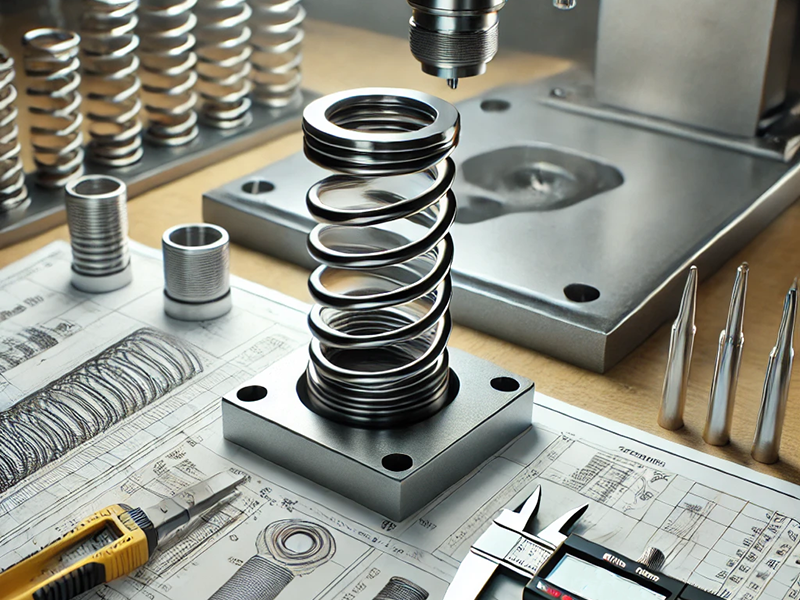Precision is the cornerstone of exceptional custom springs, influencing performance, durability, and safety across industries like automotive, lawn and garden, firearms, valves, and medical supplies. At Jackson Spring, we understand that precision in spring manufacturing is essential for creating reliable, high-quality components. This guide will delve into the critical aspects of achieving precision, providing actionable insights to enhance your processes and outcomes.
The Importance of Precision in Spring Design
Precision ensures that springs perform their intended function consistently, meeting exacting standards for specialized applications.
Why Precision Matters
- Enhanced Performance: Accurate dimensions and material properties ensure optimal functionality, improving the reliability of custom springs.
- Increased Durability: Precise engineering reduces wear, extends service life, and minimizes maintenance.
- Safety Compliance: For industries like firearms and medical supplies, precision in spring manufacturing ensures compliance with safety regulations.
Precision helps in designing springs that meet specific load requirements, environmental conditions, and application constraints.
Key Factors in Achieving Precision
Precision in custom springs starts with deliberate choices at every stage of design and production. Below, we explore the essential factors that make precision possible.
1. Material Selection
The foundation of any custom spring lies in the material used. Materials must align with the functional requirements of the spring, including load-bearing capacity, resistance to environmental factors, and overall durability.
- High-Carbon Steel: Known for its tensile strength, this material is ideal for heavy-load applications like automotive suspensions. However, it is prone to corrosion if not properly treated.
- Stainless Steel: Perfect for environments exposed to moisture or corrosive substances, such as lawn and garden tools or medical devices.
- Specialty Alloys: Inconel and titanium are used in high-stress, high-temperature applications, such as aerospace or valves handling extreme conditions.
Choosing the wrong material can lead to premature spring failure, increased maintenance costs, and reduced product reliability. Advanced metallurgical testing can help match material properties to the specific requirements of the application, ensuring precision and performance.
At Jackson Spring, we collaborate with clients to select materials that align with their performance goals while staying within budget constraints. Our team’s expertise ensures your custom springs are built to last, even in the toughest conditions.
2. Manufacturing Techniques
The way a spring is manufactured directly affects its precision, durability, and cost. Modern spring manufacturing techniques offer options tailored to the application and required tolerances.
- Cold Winding: This method involves forming springs at room temperature. It’s ideal for smaller springs requiring tighter tolerances and better surface finishes, such as those used in firearms or medical devices.
- Hot Winding: Used for larger springs that endure high loads, such as in automotive suspensions. This process involves heating the material to improve ductility during shaping.
- Surface Treatments: Techniques like shot peening, which adds a compressive layer, increase fatigue resistance. Coatings, such as zinc or powder finishes, protect against corrosion and wear.
Precision isn’t just about the shape of the spring—it’s about how well the spring performs under real-world conditions. For example, surface treatments can double the lifespan of a spring exposed to harsh environments.
At Jackson Spring, our cutting-edge equipment ensures every spring is manufactured to the exact specifications required for your industry. From coiling to finishing, we deliver springs that perform flawlessly.
3. Advanced Design Tools
Design software and analytical tools have revolutionized custom spring manufacturing, allowing for unmatched levels of precision.
- Spring Calculator Professional: This software enables engineers to simulate load capacities, deflection rates, and material performance before production begins. Adjustments can be made digitally to perfect the design, saving time and costs.
- Finite Element Analysis (FEA): FEA allows engineers to test how a spring will perform under stress by creating virtual simulations of real-world scenarios. It identifies weak points in the design and helps optimize geometry for strength and durability.
- 3D Modeling: Advanced 3D design tools create detailed visualizations of the spring, enabling clients to review and refine designs before production.
By investing in these technologies, manufacturers can avoid costly mistakes and ensure the spring meets precise tolerances. This is especially crucial in industries like firearms and medical devices, where precision can mean the difference between success and failure.
At Jackson Spring, we employ the latest design tools to streamline the development process, ensuring your custom springs are engineered for peak performance.
Challenges in Custom Spring Design
Designing custom springs often involves overcoming these challenges:
- Balancing Cost and Precision: High-quality materials and processes can increase costs.
- Spring Fatigue and Creep: Repeated stress may lead to deformation or failure if not accounted for.
- Environmental Impacts: Temperature, moisture, and corrosion can compromise performance.
Partnering with an experienced spring manufacturing expert like Jackson Spring ensures these challenges are addressed effectively.
Industry Trends & Innovations
1. 3D Printing for Prototyping
Additive manufacturing allows rapid prototyping of custom springs, enabling faster design iterations. Learn more about this trend in this article.
2. Automation in Production
CNC machines and robotics improve precision and consistency in spring manufacturing. Read about the future of automation in this article from Forbes.
3. Sustainability Initiatives
Using recycled materials and minimizing waste during spring manufacturing aligns with global sustainability goals.
Pro Tips for Mastering Custom Spring Design
For optimal results, consider these expert tips:
- Partner with Experts: Collaborate with Jackson Spring for tailored solutions in custom springs.
- Invest in Quality Control: Advanced testing, like laser measuring tools, ensures precision.
- Stay Informed: Engage with industry events to keep up with the latest spring manufacturing trends.
Conclusion
Precision is the foundation of exceptional custom springs, influencing performance, cost, and safety across industries. At Jackson Spring, we bring decades of expertise to every project, creating components that meet the highest standards.
Ready to elevate your precision parts? Contact Jackson Spring today to learn how we can help.

